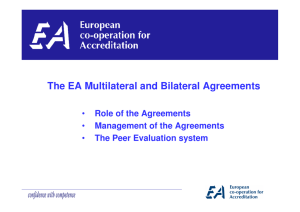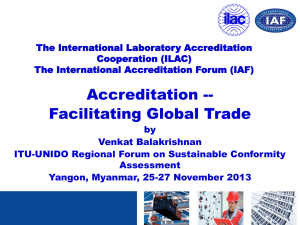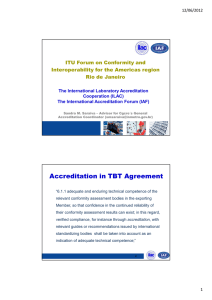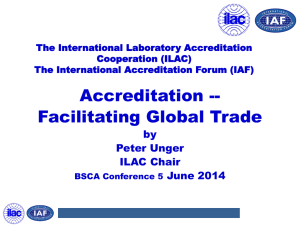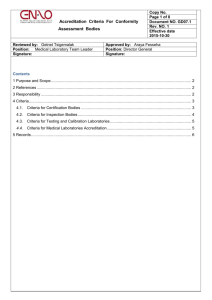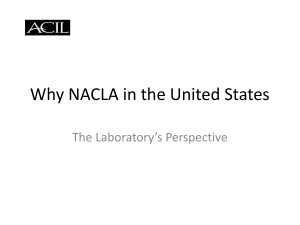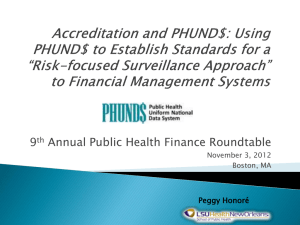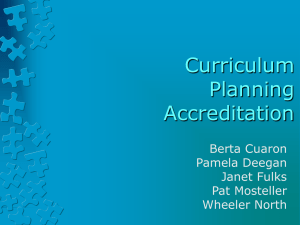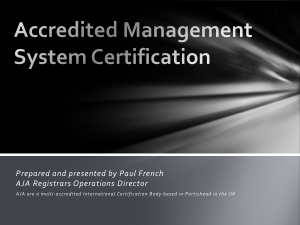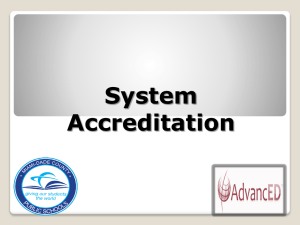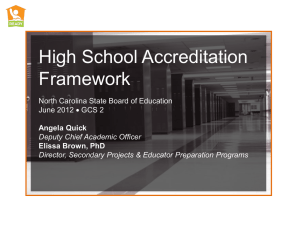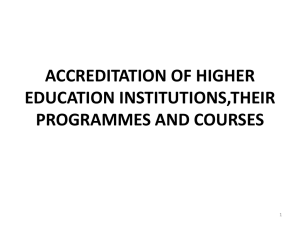ILAC The International Laboratory Accreditation
advertisement
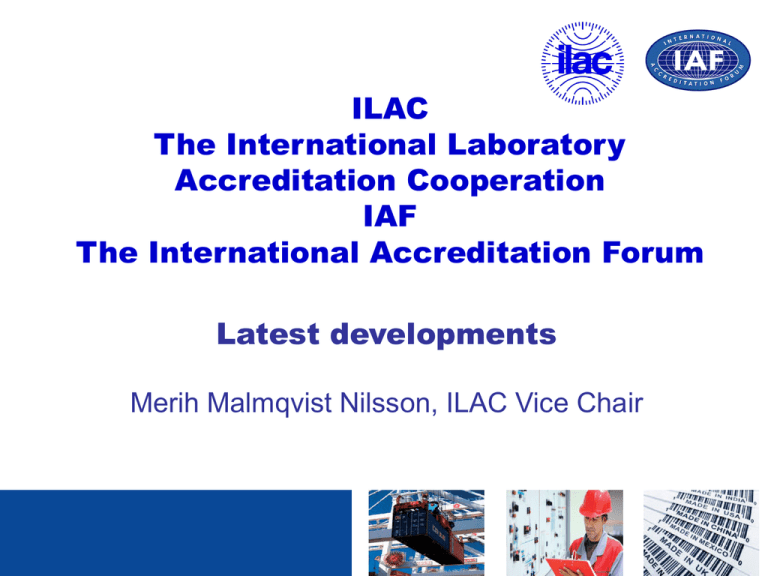
ILAC The International Laboratory Accreditation Cooperation IAF The International Accreditation Forum Latest developments Merih Malmqvist Nilsson, ILAC Vice Chair Global Vision • A single worldwide programme of conformity assessment which reduces risk for business, regulators and the consumer, by ensuring that accredited services can be relied upon. • Government and Regulators relying on the IAF and ILAC Arrangements to further develop or enhance trade agreements. • To support the freedom of world trade by eliminating technical barriers, realising the free-trade goal of ‘tested, inspected or certified once and accepted everywhere' . ILAC Membership – 30 August 2011 • 72 Full Members (Signatories to the ILAC Arrangement) representing 59 economies; • 20 Associates representing 32 economies; • 19 Affiliates representing 22 economies; • 5 Regional Cooperation Bodies • 26 Stakeholders • 31 July 2011 - 50 ILAC Full Members • Signatories represent about 95% of Global GDP • Almost 40,000 accredited laboratories • About 6,700 accredited inspection bodies • 77% of regulators accept results from accredited organisations (2010) • Inspection MRA to be launched in 2012 Coverage of the ILAC MRA ILAC MRA Signatories ILAC Associate Members ILAC Affiliate Members (Apr 2011) Status of the IAF MLA There are 49 IAF MLA Signatories, representing 47 economies. •Management Systems: 47 Accreditation Bodies and EA, PAC & IAAC • ISO 9001 QMS: 47 Accreditation Bodies and EA, PAC & IAAC • ISO 14001 EMS: 41 Accreditation Bodies and EA, PAC & IAAC • ISO 22000 FSMS: in development • ISO 27001 ISMS: in development • Product: 38 Accreditation Bodies EA, PAC & IAAC • Persons: In development Coverage of the IAF MLA IAF MLA Signatories IAF Members (Apr 2011) Regional Cooperation Bodies • The IAF and ILAC Arrangements are structured to build on existing and developing regional MLAs/MRAs established around the world. European Cooperation for Accreditation (EA) Pacific Accreditation Cooperation (PAC) Inter-American Accreditation Cooperation (IAAC) Asia Pacific Laboratory Accreditation Cooperation (APLAC) • The IAF MLA recognises EA, PAC, IAAC • The ILAC MRA recognises EA, APLAC, IAAC Southern African Development Community Accreditation (SADCA) The basis for the recognition arrangements (MRA-MLA) • International standards (ISO/IEC 17000 series) – – – – – – ISO/IEC 17011 – accreditation bodies ISO/IEC 17020 – inspection bodies ISO/IEC 17025 – laboratories ISO/IEC 17021 – certification bodies for management systems ISO/IEC 17065 – certification bodies for products and services ISO/IEC 17024 – certification bodies for persons • Harmonised implementation documents • Peer evaluation system with trained evaluators • Decision making process The Benefits For Government and Regulators • Flexible alternative to Legislation For Business • Greater acceptance of • Public confidence in goods products and services and services, despite opening up market access complex global • Avoid costs associated with • Facilitator of trade multiple testing, • An efficient monitoring inspections or tool For Consumers certifications • Informed procurement selection marketplace • Minimises product failures or recalls ILAC and OIML • • • • • • Memorandum of understanding Joint work programme Joint assessment procedure Training activities Common communication to the market Review of common documents such as OIML D10 / ILAC G24 IAF and OIML • Memorandum of understanding • Identified items for a joint work programme – A survey among IAF members; – Review of a draft OIML Basic Publication (certification system for prepackages); – Contribution to the OIML seminar on conformity to type (CTT). Common denominators for ILAC – IAF and OIML • Level playing field for all parties: producers and conformity assessment bodies • Promotion of free trade – eliminating technical barriers to trade • Conformity assessment • Traceability of measurements • Minimising costs and work load for the actors on the market • Achieving market confidence Accreditation in the Market Peer Evaluation ACCREDITATION International Standards CONFORMITY ASSESSMENT BODIES Standards / regulatory requirements / scheme criteria PRODUCT & SERVICE PROVIDERS CONFIDENCE GOVERNMENT TRUST CONSUMERS ASSURANCE PURCHASERS Recognition Who recognizes whom? • It is the users of the conformity assessment results who have the prerogative to recognize (or not) certificates from different parts of the world • It is our work to make sure that happens What is the catch? • The MLA is voluntary • Users of reports/certificates do not have to accept the MLA • There are dishonest players on the market • It is difficult to detect misuse - It can be difficult to take legal action • In other words, we cannot relax Developing countries perspective - Work load: limited personnel, too many different systems, many aid projects - Difficulties in meeting the import requirements of industrialised countries - Many different systems being imposed on them - Level playing field Let us consolidate our visions and processes and use the available systems as much as possible Summary • IAF and ILAC are committed to developing a harmonised global approach for accreditation practices to ensure consistency of approach. • Both organisations maintain the Arrangements to ensure equal reliability of accredited services. • Growing acceptance by regulators and businesses is removing technical barriers to trade, and avoiding the need for duplicate certifications, testing or inspections. • IAF and ILAC support developing economies to establish an accreditation infrastructure. Contact Details
